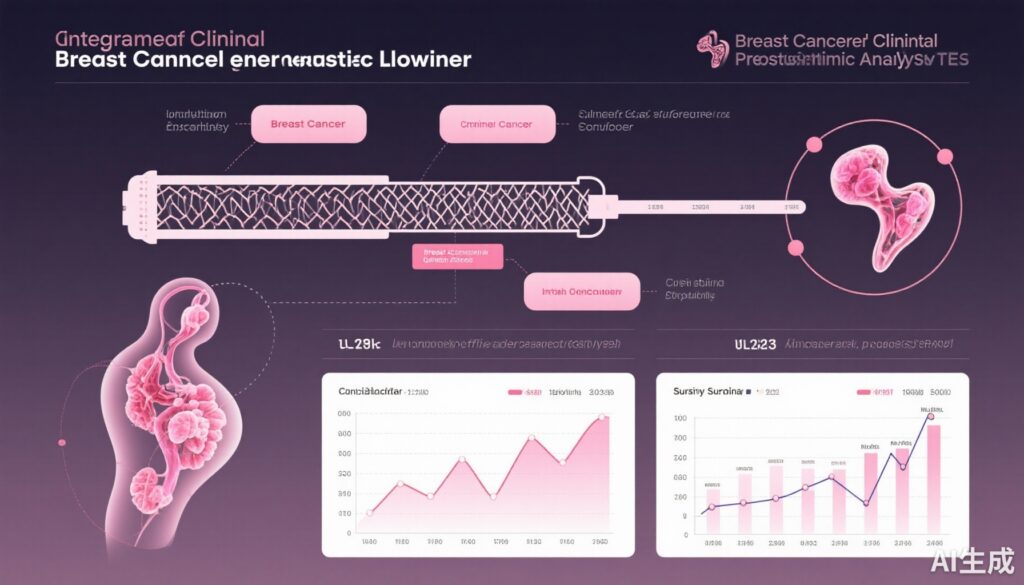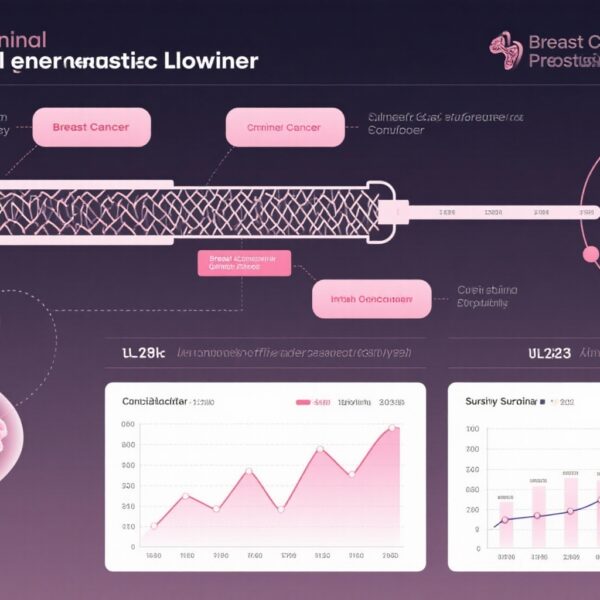Background: Clinical Context and Disease Burden
Breast cancer is the most commonly diagnosed malignancy among women worldwide, with generally favorable survival rates due to advances in early detection and treatment. However, a subset of patients, especially those with certain tumor subtypes or molecular characteristics, remain at significant risk of early mortality. Current prognostic models largely rely on clinical staging and receptor status (ER, HER2), which while effective, do not fully capture the tumor’s molecular heterogeneity or predict response to emerging targeted therapies. The comprehensive analysis of whole-genome sequencing (WGS) data linked with mortality statistics provides an innovative opportunity to refine prognostic accuracy and guide precision oncology strategies.
Study Design and Methods
This retrospective analysis included 2445 breast cancer tumors from 2403 patients enrolled via 13 National Health Service Genomic Medicine Centres or hospitals in England as part of the 100,000 Genomes Project from 2012 to 2018. Clinical data were linked successfully for 2208 cases, with mortality data available for 1188 patients, allowing robust survival analyses. The study cohort covered all stages and molecular subtypes.
Tumor and matched normal DNA underwent high-depth WGS profiling to identify driver mutations, mutational signatures, and algorithm-derived scores for homologous recombination repair deficiency (HRD), mismatch repair deficiency, and tumor mutational burden. Independent validation was performed using data from 1803 patients across three external cohorts. Prognostic evaluation focused on patients with stage I-III, ER-positive, HER2-negative breast cancer, using cancer-specific mortality as the primary endpoint over roughly five years of follow-up. Statistical analyses involved univariable and multivariable Cox regression models adjusting for established clinical factors.
Key Findings
The study uncovered several clinically and translationally significant genomic features:
1. Personalized Medicine Potential: Approximately 27% (656/2445) of tumors harbored genomic alterations with immediate therapeutic implications, including 12.2% exhibiting HRD features, which predict sensitivity to PARP inhibitors, and mutations conferring resistance to endocrine therapies. ER-positive, HER2-negative tumors showed a 6.3% HRD prevalence.
2. Translational Research Opportunities: Another 15.2% of cases revealed genomic vulnerabilities, such as compromised base excision repair pathways and dependence on non-homologous end joining, which are promising targets for future drug development.
3. Independent Prognostic Markers: Structural variation burden was strongly associated with increased cancer-specific mortality (hazard ratio [HR] 3.9; 95% CI 2.4–6.2; p<0.0001), as were high APOBEC mutational signatures (HR 2.5; 95% CI 1.6–4.1; p<0.0001) and TP53 driver mutations (HR 3.9; 95% CI 2.4–6.2; p<0.0001) in ER-positive, HER2-negative breast cancer, independent of age, stage, and grade.
4. Prognosticator Development and Validation: A genomic-based prognostic model tailored to the ER-positive, HER2-negative subgroup was constructed, enabling discrimination of patients who may benefit from treatment intensification versus de-escalation. This model was externally validated in the Swedish Cancerome Analysis Network-Breast (SCAN-B) cohort, confirming its robustness.
Expert Commentary
This landmark study demonstrates the clinical value of integrating WGS with longitudinal mortality data to unlock prognostic and therapeutic insights that go beyond traditional clinical factors. The identification of HRD and mutational signatures in a sizeable fraction of tumors highlights the utility of genomics in personalizing targeted therapy decisions.
Nonetheless, several considerations remain. The retrospective design and partial availability of mortality data may introduce bias. While the prognosticator was validated in an independent cohort, prospective validation in clinical trials is necessary to establish clinical utility fully. Implementation challenges include costs, turnaround times for WGS, and the need for multidisciplinary expertise to interpret complex genomic data.
Mechanistically, the prominence of structural variation and APOBEC-driven mutagenesis aligns with known mechanisms driving tumor evolution and therapeutic resistance, reinforcing these genomic features as critical biomarkers.
Conclusions and Future Directions
Whole-genome sequencing linked with comprehensive clinical and mortality data enriches our understanding of breast cancer biology and patient prognosis. A two-step clinical model is proposed: first, identifying patients with actionable genomic alterations for targeted therapies or trial enrollment; second, applying an integrative genomic prognosticator in patients without immediate actionable mutations to optimize treatment allocation.
This dual approach promises to enhance precision oncology in breast cancer by refining risk stratification and therapeutic decision-making. Future prospective studies and clinical implementation frameworks are needed to translate these genomic insights into routine clinical care effectively.
Funding
This work was supported by the National Institute of Health Research, Breast Cancer Research Foundation, Dr Josef Steiner Cancer Research Award 2019, Basser Gray Prime Award 2020, Cancer Research UK, Sir Jeffrey Cheah Early Career Fellowship, the Mats Paulsson Foundation, the Fru Berta Kamprads Foundation, and the Swedish Research Council.
Reference
Black D, Davies HR, Koh GCC, Chmelova L, Cubric M, Chalivelaki Chan G, Degasperi A, Czarnecki J, Toong PJ, Memari Y, Whitworth J, Zhao SJ, Kumar Y, Basyuni S, Rinaldi G, Shooter S, Dembrovskyi V, Davies R, Chatzou Dunford M, Copson E, Palmieri C, Borg Å, Ambrose J, Bunce C, Sosinsky A, Arumugam P, Brown MA, Staaf J, Turner N, Nik-Zainal S. Clinical potential of whole-genome data linked to mortality statistics in patients with breast cancer in the UK: a retrospective analysis. Lancet Oncol. 2025 Oct 7:S1470-2045(25)00400-0. doi: 10.1016/S1470-2045(25)00400-0.



